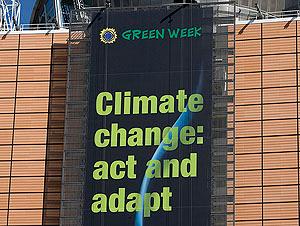The state of the green revolution
Green Week in Brussels. (Image: flickr user: Greenweek2009 (cc: by-sa))
The following is not a full transcript; for full story, listen to audio.
Don’t tell Thomas Friedman we’re having a “green revolution.”
Friedman is a Pulitzer Prize winning journalist who writes a regular column for the “New York Times.” He’s also the author of “Hot, Flat and Crowded.” He says our current crop of environmental initiatives do not add up to a green revolution.
“You will know it’s a revolution when somebody gets hurt, when people actually have to change. And do you know how you’ll really know the green revolution will be over? When the word ‘green’ disappears. They’ll be no such thing as a green radio station; they’ll just be radio stations that are built at the highest levels of energy efficiency and environmentalism. They’ll be no such thing as a green car, they’ll just be a car that will be built at the highest level of mileage standards, efficiency and environmentalism.”
To illustrate the scale of what’s needed for a true revolution, Friedman gave the following hypothetical scenario:
“If we wanted to get the amount of clean electricity that we need as a world and get off dirty fuels at the scale we need, and still let America grow, China grow and India grow, between now and 2050 to avoid the doubling of CO2 in the atmosphere … we basically would need to build a new nuclear plant a day from now for the next 36 years.”
That scenario might seem a bit far-fetched, but Friedman’s more realistic vision for a green revolution might be nearly as impossible to attain. It involves many factors — market forces, regulation, conservation — all working together in combination with “dramatic” innovation.
“The only way we achieve that scale is through innovation. We’re not going to be able to regulate our way out of the problem. We need conservation, we need energy efficiency and we need dramatic innovation to produce abundant cheap, clean, reliable electron and molecules. How do we get that? We get that through the market.
“By shaping the market with the right price signals — gasoline tax, carbon tax or cap and trade — and the same standards and regulations that make dirty fuels from hell — oil, coal and gas — much more expensive; and clean fuels from heaven — like wind and solar and tidal, bio fuels — much cheaper. That’s what we have to do.
“So we stimulate 100,000 innovators in 100,000 garages, trying 100,000 things; 1,000 of which will be promising, 100 of which will be way cool … and two of which will be the next green Google and green Microsoft.”
He says this will be the biggest industrial project mankind will ever undertake, and while he is not optimistic about whether we’re able to fully achieve this vision, he nevertheless is committed to using his platform to convince people that changes can happen.
Convincing the public might be Friedman’s biggest challenge, a public who is aware of conservation methods and green technology, yet choose not to do anything about their energy consumption. For this, he blames the current business model of utility companies.
“Up till now, our utilities have acted like $5, all-you-can-eat electron buffets, and they invited us in and they said, ‘eat, eat, eat, eat; gorge, gorge, gorge’ and come back three times a day. And as a result, they would make more profit.”
But currently two states — California and Idaho — have enacted systematic changes to their utilities that may turn things around. What these states have done, according to Friedman is decouple the incentive of utilities from selling more energy and rewarded them for selling energy efficiency. This gives utilities interest in encouraging conservation from their customers, in addition to introducing energy-saving technologies in partnership with customers.
While green energy is, at the moment, an upscale issue and less of a concern for those who are trying to figure out how to put food on the tables and keep their jobs and their houses; Friedman says it really can span the entire economy and everybody has a stake.
Green collar jobs, employing workers to assemble solar panels and retrofit homes for energy efficiency, can’t be outsourced to India he says, and the emergence of the green collar industry will emerge in the next decade if the right price signals are put into the market.
“To the Best of Our Knowledge” is an audio magazine of ideas – two hours of smart, entertaining radio for people with curious minds.
Every day, reporters and producers at The World are hard at work bringing you human-centered news from across the globe. But we can’t do it without you. We need your support to ensure we can continue this work for another year.
Make a gift today, and you’ll help us unlock a matching gift of $67,000!
